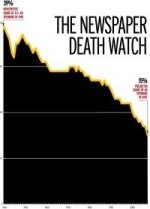
[Photo by KEVIN BURKETT]
NEW YORK TIMES SUNDAY MAGAZINE: By the early 20th century, the raucous, elbows-out era of American newspapering, there were 10 daily papers in the city. Now down to a besieged two, Philadelphia is a particularly good place to observe what appears to be big-city journalism’s last stand, when many of America’s metropolitan newspapers must quickly figure out how to become profitable again or face likely extinction. […] Annenberg’s sale of The Inquirer and The Daily News in 1969 to the Knight newspaper chain (which later became Knight Ridder) had the effect of elevating the journalism. The Inquirer established a formidable reputation by winning 17 Pulitzer Prizes between 1975 and 1990, a total second only to that of The New York Times in that period. It is certainly less ambitious now than in its peak years, when it sent reporters to cover every big national story and maintained a half-dozen foreign bureaus, but it remains a force in its region and capable of the kind of “watchdog” journalism essential in cities like Philadelphia, which seem to breed corrupt politicians. The Daily News, with a reduced staff that covers fewer stories, remains aggressive, and its distinctive voice is taken seriously in the city’s corridors of power.
is taken seriously in the city’s corridors of power.
But the journalistic worthiness of the two newspapers has not protected them. And what was seen as a possible salvation in 2006, the purchase of the newspapers by Philadelphians with deep roots in the city (the first local investors since Annenberg), has, to this point, produced only a ghastly hemorrhage of money. The new owners put up $150 million of their own. Before filing for bankruptcy, they stopped payment on $400 million in debt. They have not, however, given up, and are locked in a standoff with lenders that Brian Tierney, the leader of the ownership group, has framed as a battle to preserve quality journalism in Philadelphia.
Tierney is the central figure in Philadelphia’s newspaper drama today — an imperfect, improbable savior who in his previous role as the city’s most prominent public-relations executive was hyperaggressive, and often bullying, in his interactions with reporters. No one would compare him with Franklin, except perhaps in his self-confidence. But he has taken to newspapering with a convert’s devotion. In one of our conversations, he had to stop talking for a moment as tears came rolling down his cheeks. He was telling me about a speech he gave to an adult-education group, a routine appearance until the moderator asked everyone to join hands and pray for The Inquirer and The Daily News. “It was unbelievable they would say a prayer for us,” Tierney said as he reached under his glasses to dry his eyes. “But they care. You know, it’s not like we’re some radio station thinking about switching from Top 40 to a salsa format. This is the people’s work, a public trust.” MORE

